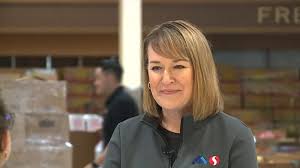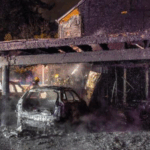Rising Hunger Amid Government Shutdown
In Wilsonville, Oregon, volunteers from Safeway Albertsons are working tirelessly to pack food boxes — responding to a growing hunger crisis that’s sweeping across the state. Their efforts come at a critical time, as the federal government’s shutdown has delayed and reduced SNAP (Supplemental Nutrition Assistance Program) benefits, leaving thousands of Oregon families struggling to put food on the table.
Safeway Albertsons, a long-standing partner of the Sunshine Division, is ramping up food donations, funding, and volunteer support. The company is also calling on customers to help by donating directly at checkout registers, hoping to bridge the widening gap left by the suspended federal aid.
“Food is our business — and hunger relief is our number one giving priority,” said Jill McGinnis, Communications Director for Safeway Albertsons. “Every dollar counts because organizations like the Sunshine Division can purchase food in bulk at a much lower cost than individuals can at retail stores.”
Also Read
A Crisis on the Brink
The Sunshine Division, a Portland-based food relief nonprofit, has been serving Oregonians in need for more than a century. However, Executive Director Kyle Camberg warns that the current situation may escalate into the worst hunger crisis in America since the Great Depression.
“The best way to help is to donate your time or your money,” Camberg told KOIN 6 News. “My fear is that this continues. That uncertainty is horrific — with more than 450,000 Oregon households already on the brink.”
The organization reports that demand for emergency food boxes has skyrocketed in recent months, as inflation, job instability, and reduced federal assistance have pushed vulnerable families closer to hunger.
Faces Behind the Crisis
The crisis doesn’t discriminate. Single mothers, veterans, children, and seniors living alone are among those turning to the Sunshine Division for help. Many of them, McGinnis noted, are facing heartbreaking circumstances.
“I’ve delivered food boxes myself,” she said. “It can take people a long time to reach the door because they’re disabled or elderly. Some don’t even have their lights on because they’re trying to save money. And yet, they’re always incredibly grateful for the gift.”
According to the U.S. Department of Agriculture (USDA), more than $140 million in SNAP benefits have not been distributed to Oregonians this month due to the shutdown. For thousands of families, that’s the difference between eating three meals a day or going hungry.
Sunshine Division’s Statewide Reach
What makes this moment especially dire is the statewide scale of need. The Sunshine Division’s work now extends from Astoria on the coast to Baker City in Eastern Oregon, and from Portland to Ashland in the south.
“This is an emergency,” Camberg said. “And your local food relief organization needs you to help now more than ever.”
Volunteers and staff are working around the clock to deliver food to communities where pantries are running dry. Shelves are being emptied faster than they can be restocked, and donations can’t keep up with the demand.
How the Community Can Help
The Sunshine Division emphasizes that both financial contributions and volunteer time are vital right now. While food donations help, monetary gifts allow the organization to buy staple items — like rice, beans, and canned goods — in bulk, maximizing impact.
For those unable to donate money, volunteering time to pack or deliver food boxes can make an immediate difference. Even small actions — like rounding up a grocery bill at the register — can provide multiple meals for families in need.
“This crisis is about neighbors helping neighbors,” said McGinnis. “If each of us does a little, together we can prevent families from going hungry.”
A Call for Urgent Action
The Sunshine Division’s history of service gives it the infrastructure to act fast, but the current pace of need is unsustainable without broad community support. Food insecurity, once a silent issue, is now becoming a statewide emergency — one that requires immediate and collective action.
“This is not a crisis we can delay responding to,” Camberg stressed. “Oregon families can’t wait for Washington to reopen or for new legislation to pass. They need food — now.”
For over a hundred years, the Sunshine Division has been a beacon of hope in tough times. But as this crisis deepens, that beacon can only stay lit if the community rallies behind it.
Conclusion
Oregon stands at a critical point. With federal food assistance stalled, costs rising, and winter approaching, hunger is spreading faster than relief efforts can reach it. But the message from both Safeway Albertsons and the Sunshine Division is clear: there is still time to act.
By donating funds, food, or time, Oregonians can help prevent what could become the nation’s most severe hunger crisis since the Great Depression — and ensure that no one in their community goes hungry this winter.












